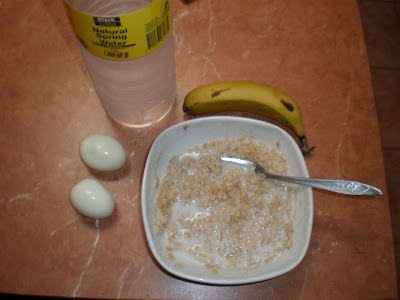Cut starchy carbs out after 4pm.
Only ingest starchy carbs for breakfast and around your workout and fibrous carbs during the rest of the day.
Fibrous carbs only on non weight training days.
You can have starchy carbs post workout no matter what time of the day.
You can have protein and carbs at the same time.
You can have protein and fat at the same time.
You can't have carbs and fat at the same time.
Starchy carbs are things like:Grains, beans, legumes, cereals (oats), pastas (brown/wholmeal), bread (brown/wholemeal), potatoes (preferably sweet).
Fibrous carbs are things like:
Fruits and vegetables- Asparagus, beans, broccoli, brussel spouts, chick peas, cucumbers, capsicum, salsa, spinach, lettuce, onions, mushrooms, tomatoes, squash, zucchini, blueberries, cantaloupe, grapefruit, kiwi, orange, nectarine, peach, pear, plum, strawberries and watermelon.
Have the most amount of starchy carbs for breakfast and taper them off during the day. If you're going to have starchy carbs, try to fit some veggies in and make sure you have protein with every meal too. If you're progressing through a dieting training program then starchy carbs are the calories you want to reduce from in each phase, while making sure you keep meal frequency at about 4-6 small meals per day with about 30-50 grams of protein with every meal. Generally I will create a 12 week program broken down into x3, 4 week phases, I find it best to make reductions at the end of the 4th week of each phase when going in to the next one. The first phase will generally be about cutting out junk, I'm generally not too strict on the starchy to fibrous carb ratio in the 1st phase, if you're not drinking or eating junk I'm happy. Phase 2 is where it becomes critical to drop the calories, make sure you're eating 4-6 small meals a day, a heap of protein with every meal and are only having starchy carbs for breakfast and post workout (maybe a starchy carb meal pre workout is fine). Phase 3 is where it gets crazy, protein, protein, protein! By this point it'll be scrambled egg whites for breakfast, chicken and vegetables for preworkout meals, starchy carbs and protein for post-workout shake and chicken and vegetables for the last meal of the day. The only variance allowed are smoothies, they make great snacks and are a quick easy way to get more fruit, vegetables and protein in.
I've said it before guys, this is up to you, make small changes each week and before you know it you will be eating healthy, don't self sabotage with junk, have meals/smoothies prepared ahead of time so you don't succumb!
 |
| Low starchy carb/high protein meal- Scrambled eg whites, ham, spinach |
 |
| High starchy carb/high protein meal- oats, skim milk, banana, egg whites |
 |
| High fibrous carb/high protein meal- fish, broccoli, peas |
 |
| High protein/fibrous carb meal, add brown rice to make high starch/fibrous meal- diced chicken breast, mixed vegetables |
 |
| Ingredients for a smoothy |
 |
| The finished product |
Bowden J., 2010. High Protein Diet Myths. Retrieved 21/04/2011.
Poloquin C. The Advantages and Disadvantages of Low Carb Nutrition. Reterieved 21/04/2011.
Studies
Brinkworth G.D., Noakes M., Clifton P.M., Buckley J.D., (2009). Effects of a Low Carbohydrate Weight Loss Diet on Exercise Capacity and Tolerance in Obese Subjects. Obesity (Silver Spring).
Cook C.M., Haub MD., (2007). Low-carbohydrate diets and performance. Current Sports Medicine Reports. 6(4):225-9.
Koutsari C., Sidossis L.S., (2003). Effect of isoenergetic low- and high-carbohydrate diets on substrate kinetics and oxidation in healthy men. British Journal of Nutrition. 90(2):413-8.
Manninen A.H., (2004).Metabolic effects of the very-low-carbohydrate diets: misunderstood "villains" of human metabolism. Journal of the International Society of Sports Medicine. 31;1(2):7-11.
Stiegler P., Cunliffe A., (2006). The role of diet and exercise for the maintenance of fat-free mass and resting metabolic rate during weight loss. Sports Medicine. 36(3):239-62.
Roberts R., Bickerton A.S., Fielding B.A., Blaak E.E., Wagenmakers A.J., Chong M.F., Gilbert M., Karpe F., Frayn K.N., (2008). Reduced oxidation of dietary fat after a short term high-carbohydrate diet. American Journal of Clinical Nutrition. 87(4):824-31.
No comments:
Post a Comment